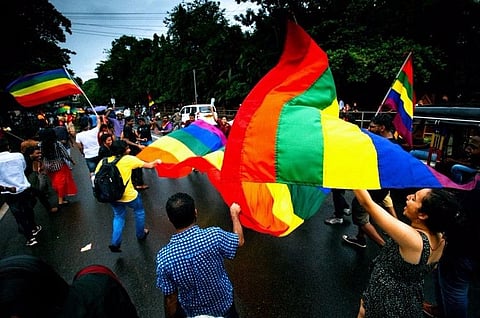

Santosh* and Rajeev*, both University students in Kochi, had gotten close in the last few months, and Santosh revealed to Rajeev that he was gay. Rajeev, however, became increasingly possessive and abusive. Ultimately, Santosh told Rajeev he was not interested in a relationship with him. Spiteful, Rajeev slapped Santosh.
Santosh thought that the worst was over, but it didn’t end there. Rajeev took screenshots of their private conversations and showed it to others at the hostel. Though most of them had professed their support for the LGBTQIA+ community, on finding out Santosh’s sexuality, the fellow hostel dwellers drove him out of the hostel.
Santosh had not been aware that the university he was attending has adopted the updated UGC anti-ragging policy of 2016, which bars ragging on the grounds of Sexual Orientation and Gender Identity (SOGI) too. Had he known, he could have raised the issue with the department. However, there is no guarantee how many faculty members would have been aware of the amendment either.
The relevant part of the UGC amendment, as given on ugc.ac.in is as follows:
UGC has notified the 3'd Amendment in UGC Regulations on 29th June,2016 to expand the definition of ragging by including the following:- 1. 3 (i) Any act of physical or mental abuse (including bullying and exclusion) targeted at another student (fresher or otherwise) on the ground of colour, race, religion, caste, ethnicity, gender (including transgender), sexual orientation, appearance, nationality, regional origins, linguistic identity, place of birth, place of residence or economic background.
“I have been visiting colleges across the state for LGBTQIA+ sensitisation. I also talk about the UGC amendment making the anti-ragging policy SOGI inclusive. But few students have heard of this. Many universities have either not adopted it; or even if they have, they haven’t implemented it by making students and teachers aware,” says Jijo Kuriakose, founder of Queerala, an LGBTQIA+ welfare association that has been conducting a study on the subject.
On November 22, after one such visit to the Calicut Medical College, the students’ union has put up the new UGC guidelines on its notice board. “Aham, a programme started by the college union in 2016, had been supportive of the LGBTQIA+ community. In the years that followed, talks and discussions on the topics of gender and sexuality have been conducted. But it is during Jijo’s talk that many realised the UGC anti-ragging policy had such an update,” says Anagha, fifth semester student and magazine editor at Calicut Medical College.
The college union has decided to revive Aham in 2020 and have such sensitisation programmes again. It was as part of one such programme that they had invited Jijo for, to speak on SOGIESC (Sexual Orientation, Gender Identity/ Expression and Sex Characteristics)-inclusive health field.
Queerala’s study was done for a project called Vistaara, under SAATHII (Solidarity and Action Against The HIV Infection in India), for which Queerala is the state level partner for Kerala. As part of the study, Jijo spoke to three people who were subjected to harassment at educational institutions due to their gender identities and/or sexuality.
Among them, Kevin*, who is gender queer, was sexually assaulted by his male classmates during a college trip. When Kevin reported this to the teachers in charge of the tour, they had no idea how to respond “to a biologically male student who approached them with a case of rape,” Jijo's study says.
Kevin was told, "If you dress like girls and tend to tempt men, they would obviously try to molest you. You should be man enough." Kevin told Jijo that these words destroyed him, and he ended up discontinuing the course.
Kevin’s case is from 2014, before the new UGC norms came into the picture. But three years after the UGC update, Queerala found that “hardly any student unions, from around 75+ colleges where we conducted sensitisation workshops on LGBTIQ inclusion, were willing to look into this beyond their once a year advocacy session.”
On a Facebook post, Queerala wrote: “Having known the deep rooted homophobia and transphobia in campuses in Kerala, implementing this inclusive anti-ragging policy is imperative as it allows a queer student to make a formal complaint if they face any form of bullying or harassment in name of Sexual Orientation/Gender Identity.”
Among the various universities that Queerala checked the status with, the updated policy is reflected at Kerala, Calicut and Cochin Universities, but not in many others. A comparative chart is given below.
Rohit PK, an MPhil student who is gay, studies at the Cochin University of Science and Technology (CUSAT), which has adopted the updated UGC anti-ragging policy. However, he says that mostly it is only on the surface that students behave as if they are okay with your sexuality. “But there would be uncomfortable talks, teasing. I decided not to stay in the hostel because of this. Someone may pass a snide comment at my roommate, like, ‘What are you up to in the room’, and this would make him uneasy.”
“I feel there is a lot of hypocrisy. Even when people say they are accepting of your sexual orientation, they aren’t really. You can feel the difference in their behaviour, in the social space, even from teachers. They don’t understand that you can like a man emotionally, beyond just a sexual relationship,” Rohit says.
Dr Baby Parampath from the Youth Welfare Department of CUSAT says that they have been conducting anti-ragging sessions which include the new definitions and additions including those on sexual orientation and gender identity. “But no such sessions are there for teachers, so perhaps teachers of all departments may not be aware of the changes. Even now, the outdated handbook given by NUALS (National University of Advanced Legal Studies) is being circulated. We are planning to bring out a booklet with the updates next year,” says Dr Baby.
*Names changed